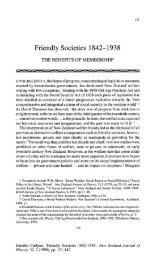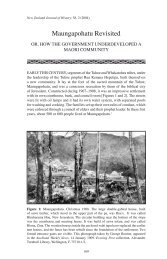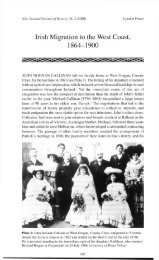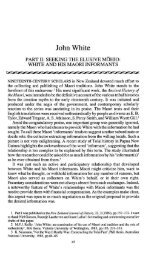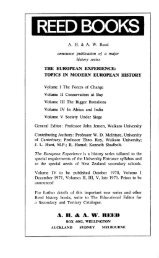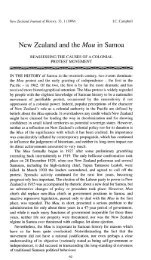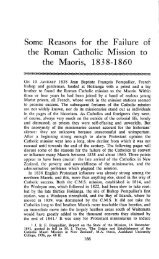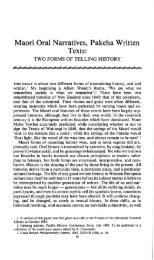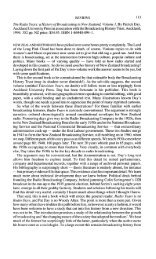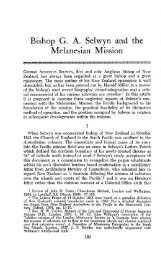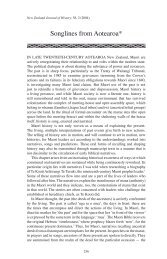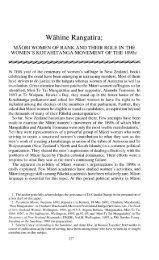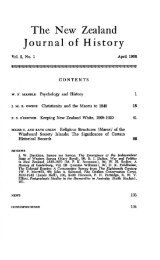The Development of the New Zealand Primary School Curriculum ...
The Development of the New Zealand Primary School Curriculum ...
The Development of the New Zealand Primary School Curriculum ...
You also want an ePaper? Increase the reach of your titles
YUMPU automatically turns print PDFs into web optimized ePapers that Google loves.
192 REVIEWS<br />
To Hogben's retirement, and to war and post-war depression is attributed<br />
<strong>the</strong> slowing down <strong>of</strong> educational change in <strong>New</strong> <strong>Zealand</strong>. <strong>The</strong> author does<br />
not, however, suggest that <strong>the</strong> 1920s were a period <strong>of</strong> educational stagnation.<br />
Legal provision was made in 1920 to raise <strong>the</strong> school-leaving age to<br />
fifteen, and in 1922 junior high school regulations were gazetted. <strong>Curriculum</strong><br />
revision was very much to <strong>the</strong> fore with, for <strong>the</strong> first time in <strong>the</strong><br />
history <strong>of</strong> curriculum development in <strong>New</strong> <strong>Zealand</strong>, practising teachers<br />
being <strong>of</strong>ficially involved. But <strong>the</strong> great depression, coinciding as it did<br />
with <strong>the</strong> directorship <strong>of</strong> <strong>the</strong> illiberal T. B. Strong and <strong>the</strong> dominance <strong>of</strong><br />
<strong>the</strong> Pr<strong>of</strong>iciency Examination, stifled fur<strong>the</strong>r innovation. From this period<br />
<strong>of</strong> educational stagnation <strong>the</strong> <strong>New</strong> <strong>Zealand</strong> education service is seen not<br />
to emerge until <strong>the</strong> accession <strong>of</strong> <strong>the</strong> Labour Party to power in 1935 and,<br />
more particularly, until <strong>the</strong> appointment <strong>of</strong> C. E. Beeby as Director <strong>of</strong><br />
Education in 1940.<br />
Beeby, like Hogben, is clearly one <strong>of</strong> Mr Ewing's educational heroes.<br />
One regrets, <strong>the</strong>refore, that, with <strong>the</strong> detailed knowledge he has <strong>of</strong> Beeby's<br />
administration, he does not tell us more about Beeby as a strategist and<br />
reformer. He gives <strong>the</strong> Director full credit, <strong>of</strong> course, for <strong>the</strong> major revision<br />
he effected <strong>of</strong> <strong>the</strong> process <strong>of</strong> curriculum change, <strong>the</strong> introduction <strong>of</strong> socalled<br />
'rolling revision', but denies us any insights into <strong>the</strong> inner life <strong>of</strong><br />
<strong>the</strong> Department <strong>of</strong> Education in <strong>the</strong> 1950s when Beeby and <strong>the</strong> changes he<br />
had promoted in <strong>the</strong> nation's primary schools were very much <strong>the</strong> target<br />
not only <strong>of</strong> newspaper criticism but also, for a time, <strong>of</strong> ministerial criticism.<br />
Mr Ewing, who shows himself throughout <strong>the</strong> book to be a most kindly<br />
critic, merely remarks that Mr Algie, <strong>the</strong> Minister <strong>of</strong> Education concerned,<br />
was 'in doubt about some <strong>of</strong> <strong>the</strong> current trends in primary education'.<br />
In his final brief chapter Mr Ewing summarises <strong>the</strong> major events in<br />
almost a century <strong>of</strong> curriculum development and analyses <strong>the</strong> forces both<br />
internal and external that have helped shape <strong>the</strong> present distinctive <strong>New</strong><br />
<strong>Zealand</strong> primary school curriculum. One's appreciation <strong>of</strong> <strong>the</strong> changes which<br />
have taken place in primary education since 1877 is enhanced by <strong>the</strong> book's<br />
excellent illustrations — any work on <strong>New</strong> <strong>Zealand</strong> educational history is<br />
extremely difficult to illustrate — and by <strong>the</strong> appendices which include<br />
questions from teachers' examination papers in 1884, extracts from Hogben's<br />
1904 syllabus and sample examination papers for pr<strong>of</strong>iciency and competency<br />
certificates.<br />
<strong>The</strong> <strong>Development</strong> <strong>of</strong> <strong>the</strong> <strong>New</strong> <strong>Zealand</strong> <strong>Primary</strong> <strong>School</strong> <strong>Curriculum</strong><br />
1877-1970 is a notable contribution to our country's ra<strong>the</strong>r thin educational<br />
literature. It should be read not only by teachers and teachers-intraining<br />
but by all who would wish to be better informed about <strong>the</strong> process<br />
<strong>of</strong> social change in <strong>New</strong> <strong>Zealand</strong>.<br />
Victoria University <strong>of</strong> Wellington<br />
I. A. MCLAREN



